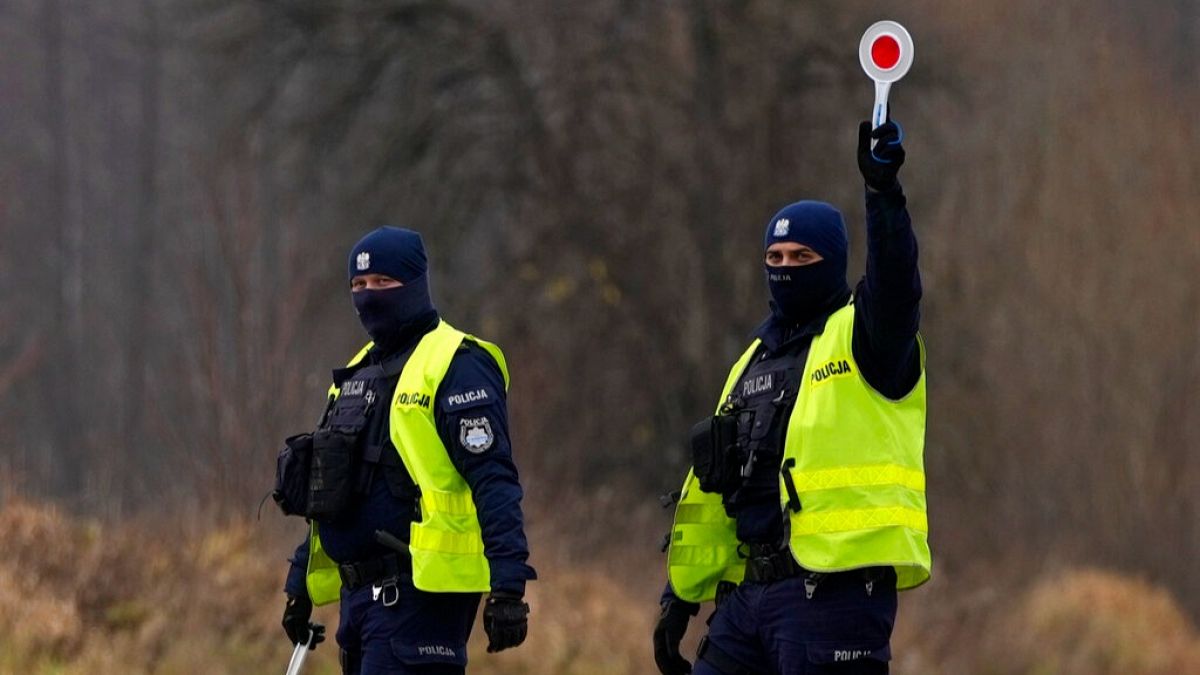Poland has reinstated border controls with neighbouring Germany and Lithuania in response to similar measures imposed by Berlin.
The changes, which Polish Prime Minister Donald Tusk announced last week, came into effect on Monday.
“We remain advocates for freedom of movement in Europe, but the condition is the shared will of all neighbours, symmetrical and united action, to minimise the uncontrolled flow of migrants across our borders,” Tusk said.
In a social media post from his ministry, Poland’s Interior Minister Tomasz Siemoniak explained that the controls were aimed at “those involved in the illegal smuggling of migrants across the border”.
“Ordinary travellers have nothing to fear,” he added.
The reinstated controls will target buses, minibuses, cars with large numbers of passengers and vehicles with tinted windows, a border guard spokesperson told PAP news agency.
The checks will last for an initial period of 30 days, although authorities have not ruled out extending them, according to the Polish government.
Pressure on Tusk, who recently survived a confidence vote in parliament, has been mounting after far-right groups in Poland alleged that Germany was transporting migrants into Polish territory after they reached Western Europe.
The German Chancellor Friedrich Merz has denied that this is happening.
Germany and Poland, which share a 467 kilometre border, are both part of the visa-free Schengen Area, which typically allows citizens to travel across borders easily for work or pleasure.
Member states are allowed to introduce border controls in times of serious threat, according to the EU.
Germany first imposed controls on its borders with Poland in 2023 to combat human trafficking and curb irregular migration.
After taking office in May, Germany’s Chancellor Friedrich Merz ordered more police to be stationed at Germany’s borders and granted them powers to turn away some asylum seekers.
Tusk said on Tuesday that Poland’s patience with Germany was “wearing out” and that without checks on the Polish side, “it becomes difficult to determine whether those being returned or redirected to Poland should be sent there”.
Merz, who campaigned on a platform for a tougher stance towards migration, has defended the measures.
On Tuesday, he told a news conference in Luxembourg that the Schengen system can only survive if its not “abused by those who promote irregular migration, in particular by smuggling migrants”.
He insisted that there were “no returns from Germany to Poland of asylum seekers who had already arrived in Germany”.
The Polish and German governments were working “to solve a common problem together”, Merz said.
Business associations and politicians in Germany have expressed concern over Poland’s decision to reinstate checks and its consequences for the freedom of movement across Europe.
“Companies need reliability and freedom of movement, not new barriers,” Helena Melnikov, Managing Director of the German Chamber of Industry and Commerce, told Handelsblatt newspaper, adding that the checks impact commuters at the German-Polish border who face not being able to get to work on time.
Katarina Barley, the deputy president of the European Parliament, called Poland’s decision a “retaliation” for Germany’s actions.
“It’s a domino effect, and of course, it’s pushing the entire Schengen system to its limits,” Barley told ARD and ZDF.
Additional sources • AP

